Review of Funny Games
Introduction
Funny Games is an Austrian film from 1997 and unless you frequent your local art-house cinema, you are unlikely to have come across it before (I certainly hadn’t).
Working from the box blurb, and indeed the opening scenes, you would expect a fairly standard psychological thriller where a family is menaced in their own home by psychopathic strangers.
You’ve seen it all before; Pacific Heights, Unlawful Entry, things like that. At least that’s what you think and, indeed, are supposed to think as the film begins. But, no. You’ve never seen anything like this before.

Video
This is film where spectacular visuals are not essential. Which is just as well because what is on display here is anything but spectacular. The fact that it is a non-anamorphic 16:9 transfer is forgivable. What is unforgivable is the poor image quality. As well as being generally grainy, the image is constantly blemished by blobs and sparkles.
It is a testimony to the power of the film that you soon forget about the image quality and get pulled into the story.
Image quality aside, the visuals themselves are quite basic but effective. There are few exterior shots; most of the action is inside Anna and Georg’s house and this is filmed in a suitably oppressive way.
One annoying thing is that the subtitles are not particularly well done. They are burnt onto the image in white and sometimes become invisible on a light background.
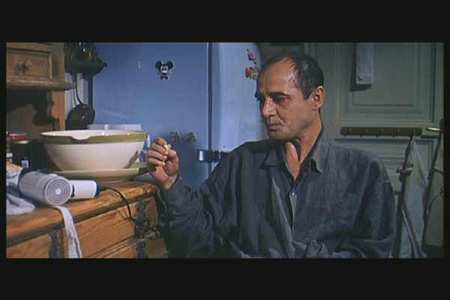
Audio
The sound quality is as unspectacular as the image quality. You get a very basic stereo soundtrack with a lot of background noise. That said, what is there is quite effective. In fact, the director skilfully uses off-screen sounds to supplement the action.
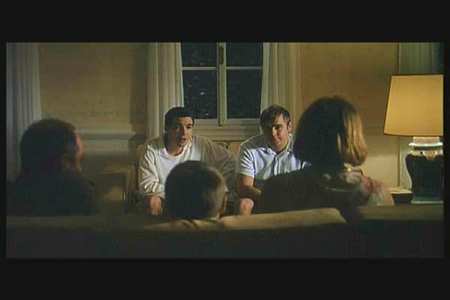
Features
In addition to the trailer, you get 3 text based features: a review of the film, an interview with the director, and cast filmographies. The review is a useful accompaniment to the film, giving it a little more context. The interview with the director is also interesting but a little pretentious. It becomes obvious that this is supposed to be Art and not entertainment.
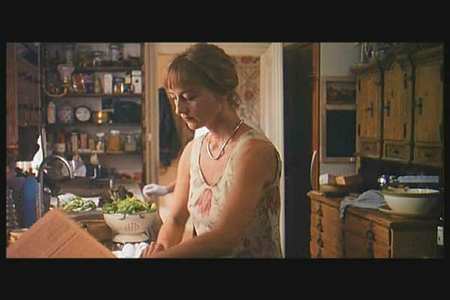
Conclusion
Funny Games is billed on the box as a thriller but that is wholly inaccurate. During this film you never feel thrilled. Unsettled, anxious and sickened, yes. But never thrilled.
It starts off conventionally enough. A well-off family (Anna, Georg, their son Georg, and their dog) is seen setting off for their house in the country. Just before reaching their house, they briefly stop off at a neighbour’s where they are given a cool reception and they notice that two strange youths are hanging around. They reach their house and start unpacking. They are just staring to settle in for the weekend when one of the youths (Paul) appears looking for 4 eggs. His story is that their neighbour has sent him round. Anna is happy to help. Paul breaks the eggs, apparently by accident, and then insists on getting more. While Anna is grudgingly getting more he knocks her mobile phone into a basin of water, ruining it.
At this point, Paul’s friend Peter appears on the scene and it becomes obvious that something isn’t quite right. For a start both Peter and Paul are wearing white gloves. Peter starts calling Paul, Tom and switching names at will. Georg comes to see what is happening and things take a nasty turn.
So far, that is relatively standard, if a little more edgy than usual. However, things soon take a turn for the unexpected. It would be unfair to say anything more about the plot because that would weaken the impact of the film. However, I can say that nothing you expect to happen happens. And not in a good way. This is a very downbeat and gloomy film – nihilistic even. What makes the film darker and more potent is the way in which hope is dangled in front of the family, not to mention the viewer, only to have it snatched away in shocking ways.
The writer/director Michael Haneke is subverting the thriller genre and the viewer’s expectations. The point of the film (and I know this because the interview with the director says so) is to shock the viewer into realising that standard Hollywood thrillers have inured them to violence and suffering. To achieve this Haneke is using the standard thriller motifs and twisting them out of recognition.
Of course, it would be hypocritical to use a horribly violent thriller to condemn violent thrillers. And, all credit to Haneke, you see very little violence. With one exception (and this one is quite deliberate and extremely manipulative), all the violence occurs off screen, and is all the more horrific because of it. You think you know what has happened and your mind (which has been twisted by years of Hollywood violence fills in the blanks). The film is called “Funny Games” and it isn’t long until you realise that the games are being played with you, the viewer, as much as with the family.
Through the horrors and degradation inflicted on Anna and Georg, the director tries to make us complicit. Occasionally, the audience is addressed directly by Peter. Anna begs Peter to stop and he turns and asks us if we want him to. This could be corny but, instead, it’s chilling. And, of course, he doesn’t stop. And, of course, we don’t want him to because we want to know what happens next. See, complicit. But, you’ll soon wish he had stopped.
Some people won’t like this film (it isn’t meant to be “enjoyed”) because it is as black as pitch. There is no light at all. But, it is worth watching. The Austrian/German cast are good in harrowing roles. Susanne Lothar as Anna is particularly good. It is well plotted and skillfully directed.
Overall, a good film but a basic DVD. Worth watching but approach with caution because it isn’t really “entertainment”.
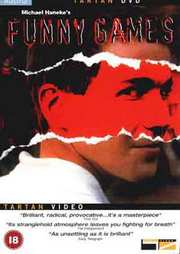
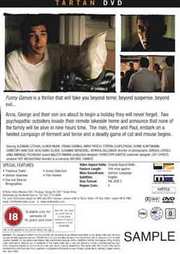











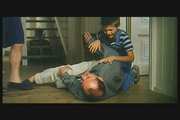


































Your Opinions and Comments
Be the first to post a comment!